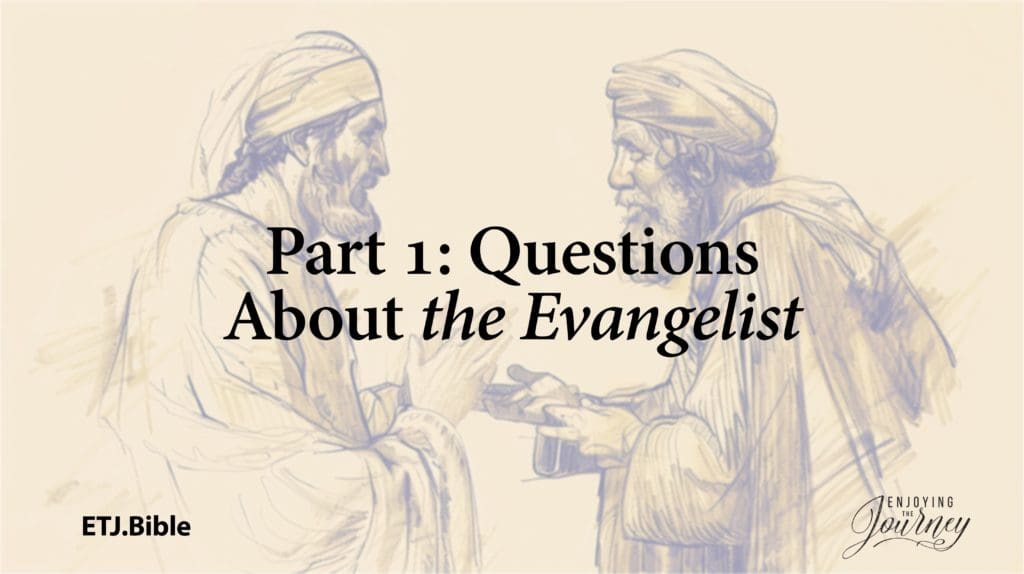
Questions About the Evangelist (Part 1)
A few months ago, I answered a number of questions that had been given to me related to the work of the evangelist. Many of these same questions come up regularly in conversation and I thought that perhaps it would be helpful to share the answers with a wider audience. If you are an evangelist, I pray that these simple thoughts will encourage you in the ministry God has given you to do. If you are a Christian, I hope you will learn to love and pray for those who are giving their lives to advancing the gospel both here and around the world. You too must do your part (read more HERE).
Q 1: What is an evangelist?
A: The term evangelist is rooted in the word evangel, which means “good news.” This means that the mission and ministry of the evangelist is rooted in his message – or, we should say, God’s message. At his core, the evangelist is a messenger and his primary message is the gospel. Some people think this means that the only message an evangelist preaches is a salvation message, but the gospel is the foundation of every good thing that is ours in Christ. It is my conviction that the evangelist is one who preaches and teaches the gospel with all of its implications and equips others to do the same. (Read more about this HERE.)
Q 2: What is an evangelist not? What does American Christianity mistake an evangelist for?
A: The world often perceives an evangelist as some flashy showman, often a charlatan. This is unfortunate and caused by the “Elmer Gantry” portrayal that some have historically associated evangelists with. Sadly, some evangelists have given room for such criticism. A biblical evangelist will be the exact opposite – he is to be a servant of Christ and the church. It is significant that the only man identified as an evangelist in Scripture was Philip and he distinguished himself first as a deacon or servant (Acts 6). On the other hand, the church also has misunderstood the evangelist as simply someone who travels around preaching sermons. Evangelists are called on to minister in many places, but it is possible to be an itinerant preacher and not fulfill the work of the evangelist.
Q 3: Was Jesus an evangelist? If yes, where do we find Scriptural basis for this?
A: It is obvious from a glance at the gospel records that our Lord Jesus had an itinerant ministry. Spurgeon called Him “the great Itinerant.” It is my conviction that our Lord actually fulfilled every office given to the New Testament church. In fulfillment of the Law we know that He fulfilled the role of Prophet, Priest, and King. There is ample evidence that because the Spirit was given without measure to Him (John 3:34), He exemplified the best of all of the gifts of the Spirit (Ephesians 4:11):
- He was an Apostle sent from God – He was on a divine mission to redeem fallen man.
- He was a New Testament Prophet – presenting the offer of the new covenant (Hebrews 3:1).
- He was a Pastor – the true Shepherd of the first church (John 10:14).
- He was the ultimate Teacher – showing the Father’s truth to those who would receive it (John 3:2).
- He was the greatest Evangelist – He fulfilled this office in two distinct ways.
- He preached the gospel everywhere that He went with a goal of making true disciples. This is foundational evangelism. The Lord Jesus was both the evangel and the evangelist – the message and the messenger!
- He reproduced Himself by teaching God’s truth and training others to do the work of evangelism (Matthew 28:18-20). The evangelist should leave both new believers and new witnesses behind him. Remember that every thing (and everyone) reproduces after its own kind! As an evangelist, Christ reproduced men who had the heart of the evangelist; in a few years they had turned the world upside down with the gospel (Acts 8:4, 17:6; Colossians 1:5-6, 23).
If you would like to learn more about the evangelist, look through the resources below. We trust that God will raise up many more servants!
Further Study:
Discover more from Enjoying the Journey
Subscribe to get the latest posts sent to your email.






